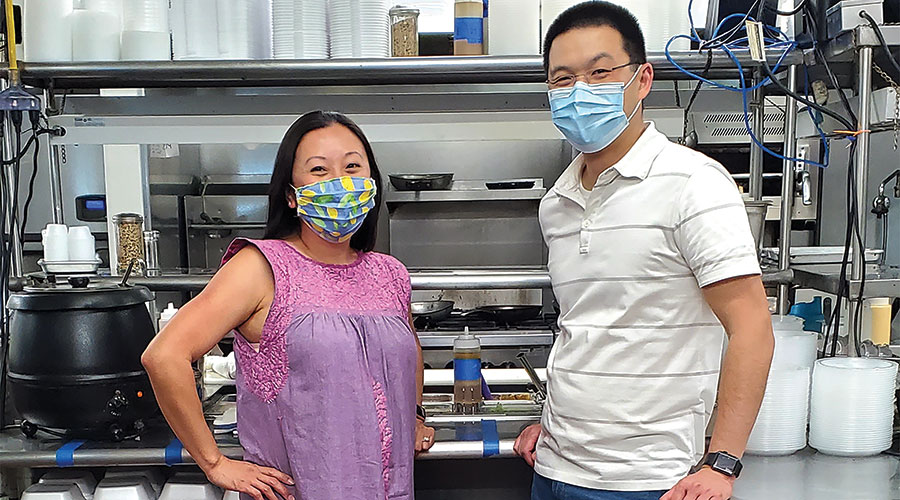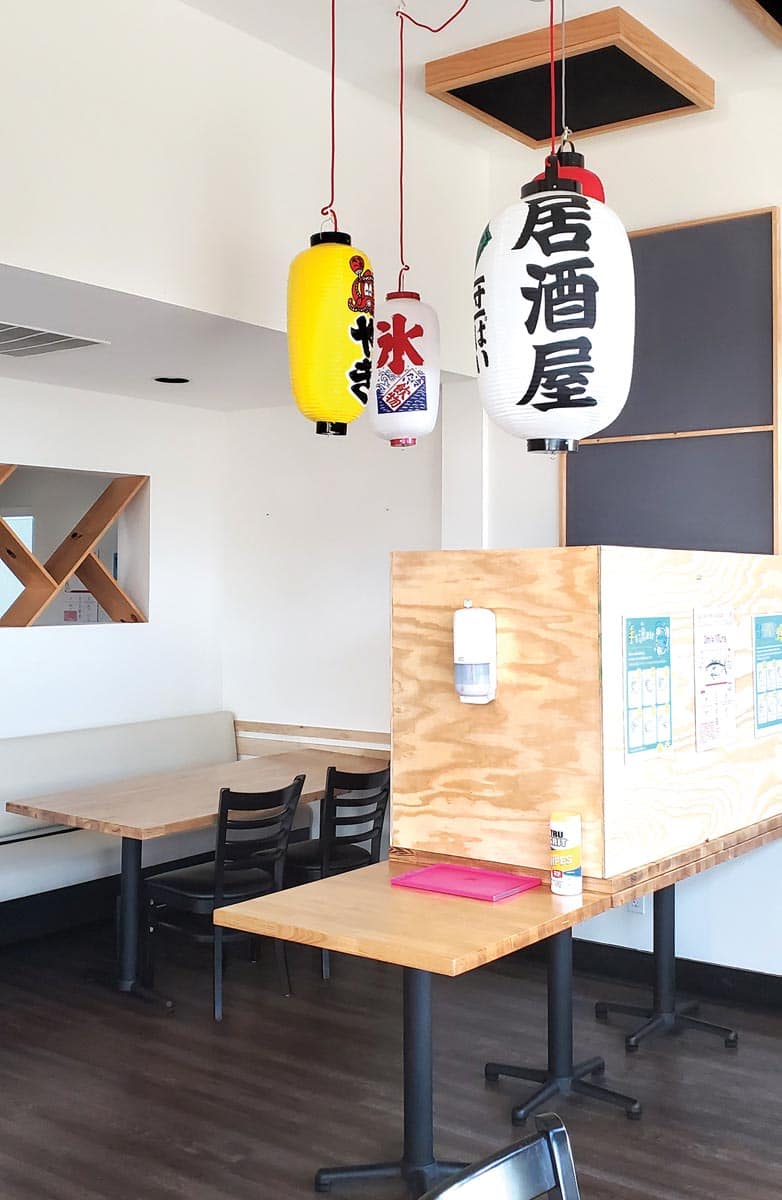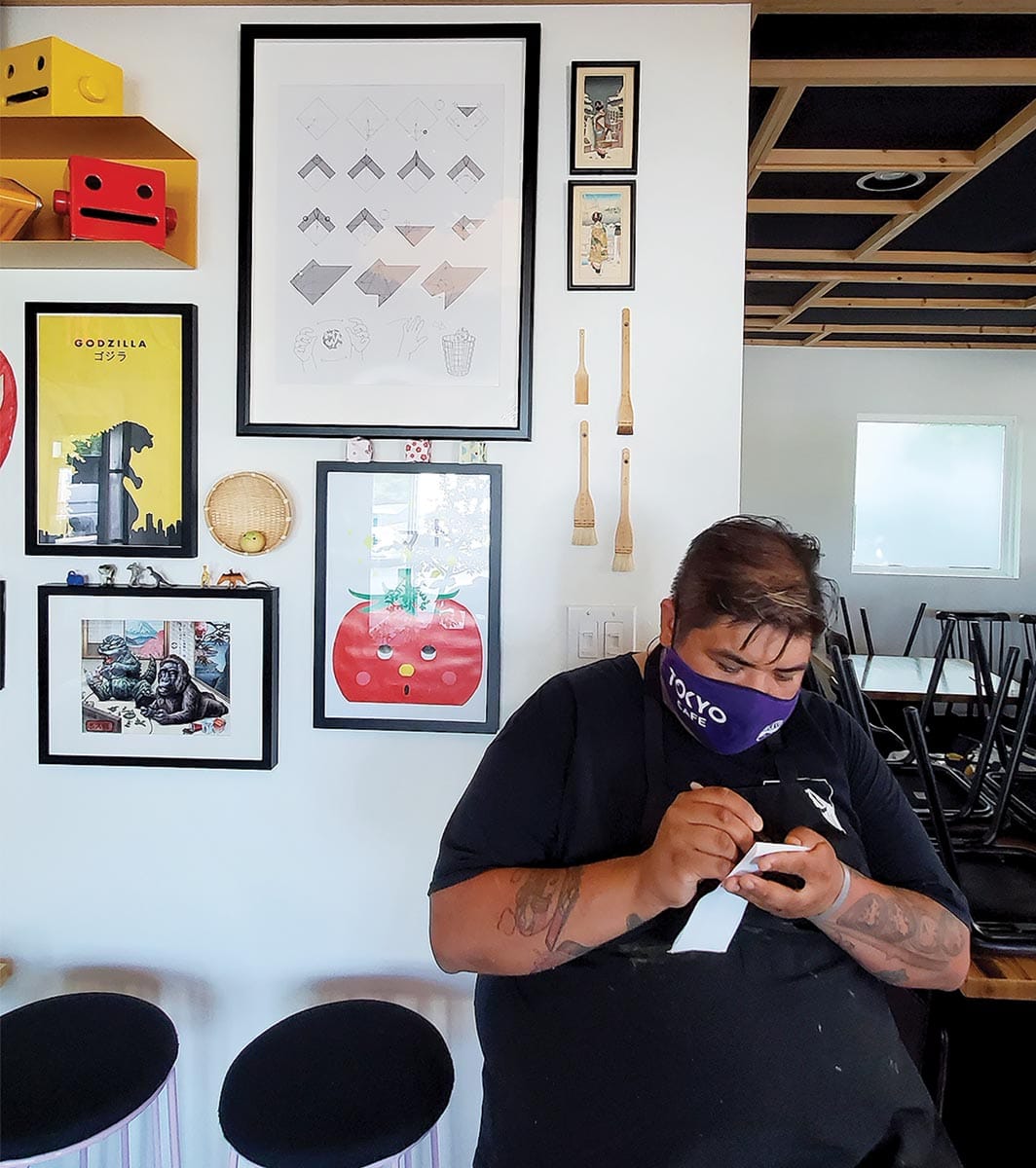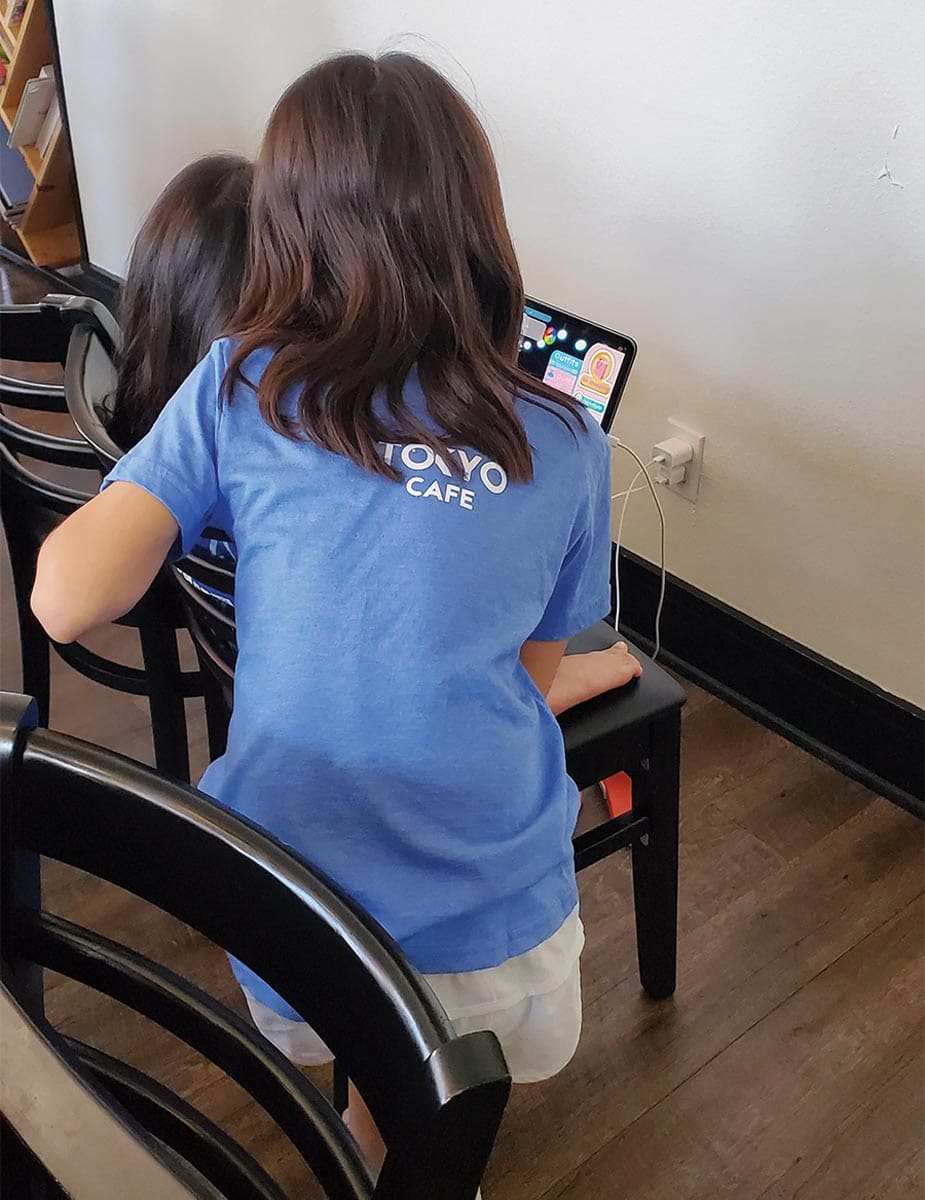
Shop Talk
Story and photos by Meda Kessler
Survival and success in the restaurant business requires a magic combination of hard work, passion, humility, more hard work and a little luck. But life happens: First a fire, and then a pandemic. Jarry and Mary Ho talk shop.
With their three restaurants closed due to the pandemic, Mary and Jarry Ho have felt the pressure that comes with being small-business owners.
“I cried every day for three weeks,” says Mary. “I knew Jarry was stressed out when he asked me to get the biggest bag of chocolate I could find during a supply run to Sam’s Club. And he didn’t even care what kind.”
It’s the second week of May, and we sit down to talk at Tokyo Cafe, spreading out among the tables and chairs. We wear face masks, as does the staff. The place is a bit of a wreck, as they’ve been cleaning and sprucing up in anticipation of reopening their dining room.
This popular neighborhood restaurant in Fort Worth shut the doors in mid-March. Since then, the Hos have furloughed and laid off employees, switched to strictly curbside takeout, supported Tokyo’s chef in a weekly free-food giveaway and brought back staff. They’ve also worked out a plan to allow partial inside seating, following not only state guidelines but their own moral compass.
In keeping with their personalities, the Hos are moving forward in a quiet and cautious manner. Jarry mentions he has been talking to his brother, who used to live in Taiwan and dealt with a SARS coronavirus outbreak there in 2003, and he has been reading detailed safety playbooks written for restaurants. He has, he admits, worked even longer hours these past few months than during normal times. Mary has had to juggle restaurant duties and virtual learning with their kids. “I think we’re going to be dealing with this for a long time,” says Jarry.
They are young — Mary is 38 and Jarry is 41 — and both have retained their youthful looks despite being part of the stressful restaurant industry since graduating from Texas A&M.
When he didn’t find a job to his liking after college, Jarry returned to Fort Worth to help run the restaurant in 2002, eventually giving his parents a chance to retire. He says he absorbed a lot from his mom and dad when he helped out at other restaurants they owned when he was a kid (his parents opened Tokyo in 1997, when he was a freshman in college). “I learned about work ethic and values along with the importance of creating a dining experience for customers. Keeping employees happy also was important to them, and now it’s important to me.”
After graduating college, he worked alongside his mother until she began working less. He did everything, from washing dishes to manning the stove, along with keeping the books and ordering supplies. “I loved math and spreadsheets, and I have always been a saver. When I took things over at Tokyo, I applied these skills to streamline daily processes.”
Mary, meanwhile, had earned a business degree at A&M and was working in Dallas at FedEx Kinko’s. Jarry didn’t have a lot of spare time, so they would meet once a week after he got off work on Saturday nights. Mary had worked in her aunt’s restaurant growing up, but it was counter service. “I was shocked by all of Jarry’s stories about the restaurant world,” she admits. Despite that, she married him, even knowing she wasn’t headed to a honeymoon in Tokyo, Japan, but instead immediately going to work at Tokyo Cafe with her new husband. “It was an adjustment,” says Mary, “and a lot of stuff already was established. I tried to not get in the way at the beginning. There also was a lot of together time, so we had to figure out our boundaries.”
One turning point was the hiring of Scott Kaiser, their first trained chef. “Scott had a lot of experience and took us to a different level. It was nice to collaborate with him on ideas,” Jarry says.
Kevin Martinez joined the kitchen staff in 2009, bringing with him a sense of adventure and a solid work ethic, along with cooking skills. Restaurant life was good for the Hos, good enough that they felt like it was the right time to have a baby. Madelyn, born in 2010, quickly became a familiar face at Tokyo Cafe, where she has grown up meeting and greeting customers. Today, before the dinner shift begins, she and little sister Sophie, 7, enter the kitchen to bid good night to all the chefs before they head home with Mom. “The girls say ‘thank you’ to the staff before leaving each day because we want them to be grateful and understand all the hard work everyone puts in,” Mary says.
As part of their culinary research, the Hos were regulars on the restaurant scene (before they had kids, Mary says with a smile), checking out new hot spots in Dallas and beyond. In 2011 they opened Shinjuku Station in Fort Worth, a smaller restaurant emulating a casual Japanese izakaya and featuring a more adventurous menu. Casey Kha, Mary’s brother, joined them as a co-owner and manager of the new property. “It was a chance to offer dishes that I didn’t think would work at Tokyo,” says Jarry, who also looked at the expansion as a challenge and a substantial risk.
Shinjuku was a hit with critics and diners. When it made Texas Monthly’s top 10 list of Best New Restaurants in 2012, the Hos were thrilled, but in their typical low-key manner. “We actually hired a marketing firm, but when they booked us on a local TV station, we declined. That just wasn’t us,” says Jarry.
Mary also is conflicted by success. “One of our daughter’s friends saw us in a local magazine and asked her if we were famous. While I think a restaurant would make a good reality show, it’s really not about us.”
They made plans to open a third Fort Worth restaurant, Cannon Chinese Kitchen, to showcase more of their heritage, but real life got in the way when a fire at Tokyo destroyed the restaurant in 2014. They managed to get Cannon open the following year, but Jarry saw all his time taken up by the reconstruction of Tokyo. His love of design served him well as he oversaw the renovation; he even crafted the oversize light fixtures there today.
In fact, Jarry briefly considered branching out into restaurant construction after getting Tokyo back open in 2016. “I always wanted to be an architect,” he says. “My parents were not that crazy about the idea.”
Tokyo Cafe has been busy ever since reopening following the fire. “We have such loyal customers. They got us through the fire, and they’re here for us today. It’s humbling.” Martinez, now head chef, and Jarry have developed a simpatico relationship. The shutdown has been their biggest challenge yet.
“Telling people that you’re not sure you can keep them on payroll, keeping up with the paperwork, trying to keep the business going on a smaller scale … it’s been hard,” says Jarry. “This is our life’s investment, and it’s scary to ever think we could lose it.”
The Hos have approached the concept of reopening Tokyo Cafe as if it were a new restaurant. They want their customers to see all they are doing to keep staff and customers safe.
“We had a really bad Friday around week three [after the shutdown],” says Jarry. “We got slammed, we mixed up orders, even DoorDash [a delivery service] was having issues because it was so busy their website crashed. It was rough, but we had a good meeting that night and came up with solutions. I feel like that was a turning point for all of us.”
Jarry and Mary shake their heads at the notion that owning a restaurant is glamorous. “It’s all about passion, drive and the ability to adapt,” says Jarry.
“If you’re doing things right, you’ll never have enough free time. And you’ll always feel like you could do better. But every day we feel lucky — very lucky. ”
THE DETAILS
Tokyo Cafe 5121 Pershing Ave., Fort Worth, 817-737-8568 or tokyocafefw.com
Shinjuku Station 711 W. Magnolia Ave., Fort Worth, 817-923-2695 shinjuku-station.com
Cannon Chinese Kitchen 304 W. Cannon St., Fort Worth, 817-238-3726 cannonchinesekitchen.com




